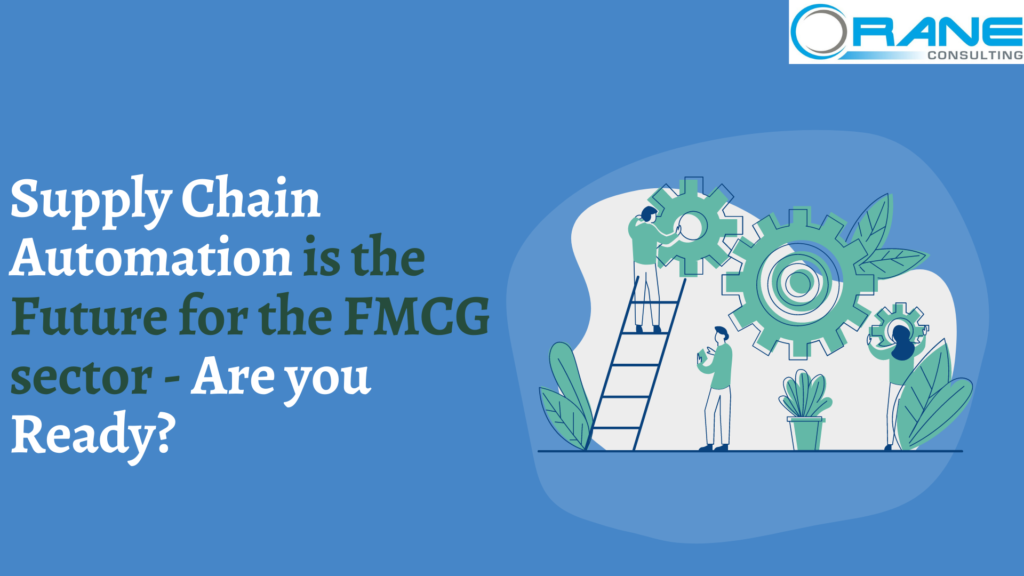As a growing FMCG company, how do you go about implementing automation into your supply chain? To transform into an automated supply chain, you need the following three components:

Blog
Orane’s blog posts keeping you up to speed with what’s hot in the world of business.
Supply Chain Automation is the Future for the FMCG sector – Are you Ready?

Introduction:
Driverless trucks moving goods to and from warehouses, with real-time location updates. Yes, that is the future of supply chain management in the FMCG sector. The post-COVID economy is now dominant with eCommerce practices with customer orders being shipped directly from distribution centers to the customer.
A recent infographic by Visual Capitalist reveals that 55% of FMCG retail and logistics companies are investing in automating their warehouses. A 2019 Gartner report projects that 30% of warehouse workers will be aided by robots by the year 2023.
Also referred to as Supply Chain 4.0, supply chain automation is an umbrella term for a host of underlying technologies including Robotics, Artificial Intelligence (AI), Big data analytics, and the Internet-of-Things (IoT).
On the flip side, the same Visual Capitalist report reveals that 49% of order fulfillment operations are still manual – with only 4% being fully automated.
So, the question is that are you as an FMCG company ready for a future in supply chain automation, and what are the common challenges that are stopping you? Let us discuss all that.
Supply Chains in FMCG – 3 Leading Challenges
What are the common challenges or pain points faced by today’s global supply chains – and how can automation help in mitigating them?
Let us first look at three leading challenges in supply chains:
1. Keeping up with market demand
Global supply chains are often impacted by reasons that are out of the control of the FMCG industry. This includes geopolitics or changes in industry regulations and consumer demands. Any of these factors can pose a serious disruption to the existing supply chain operation. Adding to that, 25% of supply chain executives report high delivery costs as among their top problems.
Supply chains need to be flexible and agile enough to respond to changing demands. Instead of relying on manual operations, supply chain automation with efficient logistics management can streamline product deliveries, while keeping delivery costs under check.
2. Meeting customer expectations
Efficient supply chains need to respond to changing customer expectations or needs. It is based on the principle of providing the right product at the right time and price to the end customer. Along with these, modern-day customers expect the right service that is customized to their needs.
Supply chains are put into motion once the customer has placed the order. Following this, supply chain executives have the responsibility of knowing which product has been ordered, where it needs to be picked up from, and by when it will be delivered – all of which can be tedious and time-consuming.
Supply chain automation uses technology to complete the order fulfillment process – while providing customers with real-time order status and other information.
3. Ensuring Cost Optimization
ompared to inefficient supply chains, fully-optimized or efficient supply chains have a 15% lesser cost factor and 50% lesser inventory levels. The increasing costs of procuring raw materials and equipment have also added to the rising costs in global supply chains. Despite these constraints, FMCG companies are expected to grow or maintain production levels and sell affordable products to their customer base.
On its part, supply chain automation can optimize the process and even cut down on operational costs. For instance, Supply Chain 4.0 is projected to reduce:
Operational costs by 30%
Inventory levels by up to 75% – that could massively reduce inventory costs
Lost sales by up to 75%
How to implement Supply Chain Automation
Define your vision
The first component is to define a clear vision of your automation needs. This is based on the current wastes in your supply chain and how they are impacting your FMCG business. Mike Burnett of Gartner talks about the “struggles faced by supply chain leaders” of developing a vision to “imagine what is possible.” Without a defined vision, it is impossible to develop a clear business value from automation.
Develop your capabilities
After converting a vision into supply chain value, the second step is to develop the digital capabilities that will enable the automation process. This includes the development of an efficient IT infrastructure to build digitalization, along with the development of the right talent, organizational culture, and collaboration. Despite the advancing technologies, the human factor will continue to be an integral part of supply chains in the future. To enable this, FMCG companies must continue to nurture teamwork and collaboration to realize their supply chain objectives.
Develop a digital supply chain infrastructure
Technologies like advanced business analytics and AI can develop an efficient supply chain digital infrastructure. FMCG companies must increase their digital investments into these technologies, which will enable a fast and accurate decision-making process across the entire supply chain.
Conclusion
With supply chain automation on the rise, the question is which automation tool is right for your FMCG business. Developed by Orane Consulting, DealerPro is a comprehensive supply chain tool that can reduce operational costs and is fast to implement in any environment. With DealerPro, you can deliver the right product at the right time and price to your customers.
Want to know more about how DealerPro can help your business? Book your demo today.
Subscribe to our communication
You agree to receive newsletters, marketing communication and latest developments from us.

6 Tips to Boost Your Business Performance
- August 19, 2022

How ERP Implementation is Essential for Businesses? – Top 5 Reasons
- August 19, 2022

Take your Data into next level
- August 19, 2022

Rise with SAP: Business Benefits
- August 19, 2022

SAP Masterdata Management
- August 19, 2022

